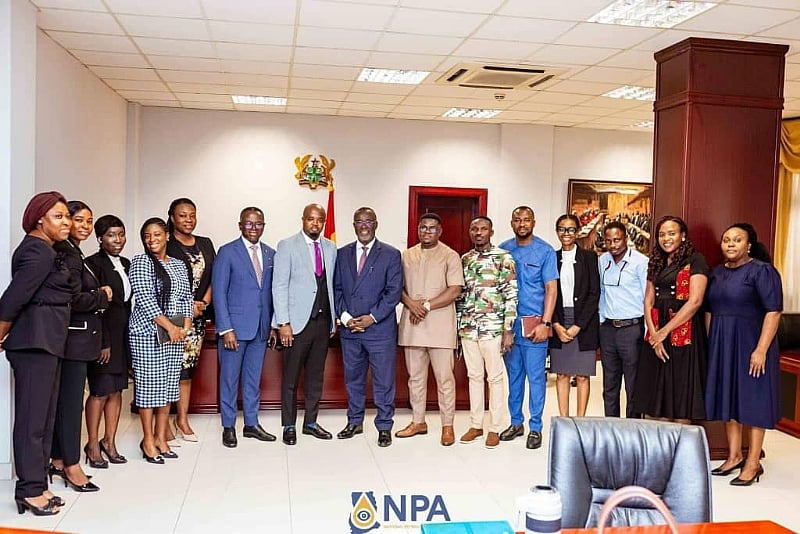The National Petroleum Authority (NPA) of Ghana is seeking to establish a dedicated Petroleum Court to address the growing challenge of criminal activities within the downstream petroleum sector. The NPA, responsible for regulating and overseeing this vital sector, has identified the slow pace of legal proceedings as a major obstacle to effective enforcement and deterrence. The rapid growth and diversification of the downstream petroleum industry, fueled by significant public and private investment, have unfortunately been accompanied by an increase in illegal activities, necessitating a more robust and responsive legal framework. The NPA believes a specialized court will ensure swift justice, thereby safeguarding the integrity of the industry and protecting national economic and energy security.
The NPA’s Chief Executive, Godwin Kudzo Tameklo, Esq., formally proposed the establishment of a Petroleum Court during a meeting with the Acting Chief Justice, Justice Paul Baffoe-Bonnie. Mr. Tameklo highlighted the limitations of the NPA’s internal dispute resolution mechanisms, particularly in handling criminal cases that often experience significant delays within the general court system. He emphasized the critical role of the downstream petroleum sector in Ghana’s energy security and argued that delays in prosecuting offenders undermine confidence in the regulatory framework and threaten the integrity of the industry. A dedicated court, or at least a designated judge specializing in petroleum-related matters, would streamline the legal process, enabling swift and consistent application of the law. This would not only punish offenders but also serve as a deterrent to others contemplating illegal activities.
Justice Baffoe-Bonnie acknowledged the merits of the proposal and expressed his willingness to explore the possibility of a dedicated Petroleum Court, recognizing the frustrations caused by protracted legal proceedings. He agreed that swift justice is crucial for deterrence, sending a clear message that illegal activities will have consequences. However, he also pointed out the significant constraints faced by the judiciary, including a shortage of judges and an already overburdened court system. These challenges, he cautioned, could hinder the immediate establishment of a fully independent Petroleum Court.
As a pragmatic alternative, Justice Baffoe-Bonnie suggested designating an existing court to handle petroleum-related cases for a specific period each week, potentially two days every fortnight. This designated court, while not entirely independent, would effectively function as a specialized Petroleum Court, providing a focused platform for addressing the unique legal challenges within the downstream petroleum sector. This approach, he suggested, would offer a practical solution in the face of existing resource constraints. He emphasized the importance of focused attention on these cases, suggesting the court be officially designated as the “Petroleum Court” even within this framework, to underscore its specialized mandate.
The Acting Chief Justice also expressed concern about the pervasive culture of indiscipline across various sectors in Ghana, including the petroleum downstream. This pervasive indiscipline, he argued, erodes the fabric of society and requires decisive action. He emphasized the importance of consistent and decisive enforcement of the law as a means to curb this trend. Swift justice, he reiterated, is essential not only for punishing offenders but also for sending a clear message of deterrence to potential wrongdoers. This emphasis on deterrence underscores the importance of the proposed Petroleum Court in upholding the rule of law and protecting the public interest.
The NPA’s pursuit of a specialized Petroleum Court follows the 2020 grant of prosecutorial powers to the Authority under the Appointment of Public Prosecutors Instrument (E.I. 378). This empowerment enables the NPA to prosecute offenders of the National Petroleum Authority Act, 2005 (Act 691) and related laws. The proposed collaboration with the judiciary represents a significant step in ensuring that these powers are exercised effectively. The establishment of a Petroleum Court, whether as a completely independent entity or a specialized division within an existing court, would significantly enhance the NPA’s ability to enforce regulations, deter illegal activities, protect consumers, and ensure the integrity and security of Ghana’s vital downstream petroleum sector. This initiative underscores the NPA’s commitment to maintaining a robust and responsive regulatory framework that keeps pace with the evolving dynamics of the industry.
The proposed Petroleum Court is expected to expedite the prosecution of offenders within the downstream sector, addressing the current delays that hamper effective enforcement. By streamlining the legal process, the court will facilitate the swift application of the law, holding perpetrators accountable and discouraging future criminal activity. This enhanced enforcement capability will contribute significantly to strengthening the regulatory framework, bolstering investor confidence, and safeguarding the long-term health and stability of Ghana’s downstream petroleum industry. The initiative also highlights the NPA’s commitment to collaborating with key stakeholders, including the judiciary, to address the evolving challenges within the sector. A dedicated Petroleum Court represents a significant step towards achieving the NPA’s mandate of regulating, monitoring, and overseeing Ghana’s downstream petroleum sector effectively and efficiently.














